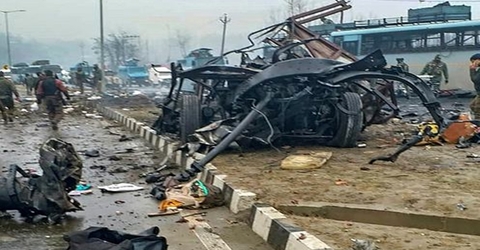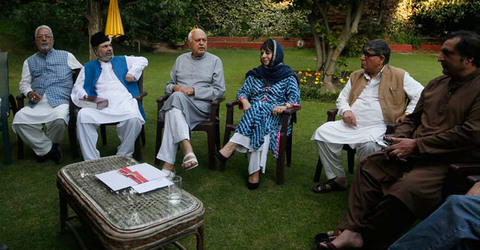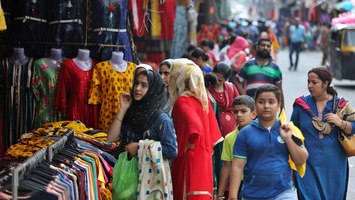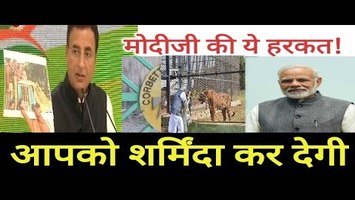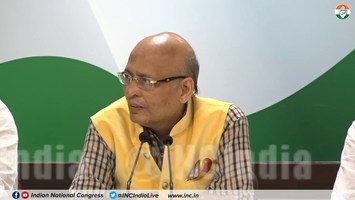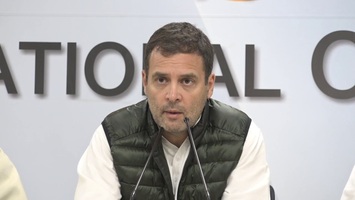Jammu and Kashmir: Defense Minister spoke to Army Chief regarding Doda encounter
Tuesday, July 16, 2024
India's Defense Minister Rajnath Singh has spoken to the Army Chief regarding the encounter between security forces and terrorists in Doda, Jammu and Kashmir, India.
The office of Jammu and Kashmir Lieutenant Governor Manoj Sinha has tweeted and paid tribute to the soldiers killed in this encounter.
The office of the Defense Minister of India has shared this information on the social media website X.
In this post, the Defense Minister's office has written, "Defense Minister Rajnath Singh spoke to the Chief of Army Staff General Upendra Dwivedi this morning. The Army Chief has briefed the Defense Minister about the ground situation in Doda and the ongoing anti-terrorism operation there."
The Lieutenant Governor's Office of Jammu and Kashmir wrote on X, "I am deeply saddened to learn about the cowardly attack on Army personnel and Jammu and Kashmir Police personnel in Doda district. Tribute to the brave soldiers who made the supreme sacrifice in the security of our nation. My deepest condolences to the bereaved families.''
''We will avenge the martyrdom of our soldiers and thwart the nefarious designs of terrorists and their collaborators. I appeal to the people to unite in the fight against terrorism. Also, I appeal to give us accurate information so that we can intensify the anti-terrorism operation and neutralize the terrorist machinery.''
The operation of security forces is going on in the Dessa forests of Doda district since the night of Monday, 15 July 2024.
No official information has been shared so far about how many soldiers have been killed in this operation.
Our soldiers and their families are bearing the brunt of BJP's wrong policies: Rahul Gandhi
Tuesday, 16 July 2024
Four soldiers, including an army captain, have died in an encounter with terrorists in Doda, Jammu and Kashmir, India.
The Indian Army has tweeted on the social media website X and informed that Captain Brajesh Thapa, Naik D Rajesh, Sepoy Bijendra and Sepoy Ajay have died in an encounter with terrorists.
The Indian Army has written in the post, "On behalf of Chief of Army Staff General Upendra Dwivedi and all ranks of the Indian Army, deepest condolences are expressed to Captain Brajesh Thapa, Naik D Rajesh, Sepoy Bijendra and Sepoy Ajay, who sacrificed their lives while performing their duty during an anti-terror operation in Doda to ensure peace in the area."
"The Indian Army stands with the bereaved families in this hour of grief."
India's Defense Minister Rajnath Singh has also paid tribute to the slain soldiers in a post on the social media website X.
Rajnath Singh has informed, "The anti-terror operation is going on and our soldiers are committed to end the curse of terrorism."
Lok Sabha opposition leader Rahul Gandhi has paid tribute to the soldiers killed in a post on Instagram and has questioned the central government.
Rahul Gandhi has written, "Today our soldiers were martyred again in a terrorist encounter in Jammu and Kashmir. I pay my humble tribute to the martyrs and express my deepest condolences to the bereaved families."
"Such horrific incidents one after the other are very sad and worrying. These continuous terrorist attacks are telling the dilapidated condition of Jammu and Kashmir. Our soldiers and their families are suffering the brunt of BJP's wrong policies."
What did the parents of Captain Brijesh Thapa, who was killed in the Doda encounter, say?
Tuesday, July 16, 2024
News agency ANI has spoken to the parents of Indian Army Captain Brijesh Thapa, who was killed during an encounter with terrorists in Doda, Jammu and Kashmir.
Brijesh's mother Neelima Thapa said, "I have lost my son. Now he will never come back. My boy was very decent. He never complained."
Brijesh's mother said, "He had to join the army. We had also told him that life in the army is difficult. He had also seen his father. We had told him to either go to the Air Force or the Navy but he decided to join the army."
"We feel proud of whatever he has done for the country. The government should take strict action against those responsible for this."
Brijesh Thapa's father, who is himself a retired colonel of the Indian Army, said, "My son wanted to join the army since childhood. He had done B.Tech but still he wanted to join the army.''
"He had not prepared much but still he cleared all the exams including SSB in the first attempt. I am proud that he gave his life for the country.''
Owaisi criticized PM Modi on Doda encounter
Tuesday, July 16, 2024
AIMIM Chief and Hyderabad MP Asaduddin Owaisi has questioned the central government and Prime Minister of India Narendra Modi after four Indian Army soldiers were killed in an encounter with terrorists in Doda, Jammu and Kashmir.
Owaisi said, "Narendra Modi was talking big that we will enter the house and kill. Then what is happening?"
Owaisi said that "This is a sheer failure of the government. It is not able to control terrorism. Whatever happened in Doda is very dangerous and it should be investigated.''
Four soldiers including an army captain have died in an encounter with terrorists in Doda, Jammu and Kashmir.
Owaisi said, "I want to tell that we condemn this and have been doing so. But this is the biggest failure of the Modi government.''
Cornering PM Modi, Owaisi said, "The area of Doda is very far from the LoC. It is a very serious matter that terrorists are attacking so far from the LoC, in which four soldiers of our army, including a captain and a major, are killed. This incident also describes the failure of the Narendra Modi government.''
Owaisi said, "After 2021, the maximum terrorist incidents are happening in Jammu. Even during the rise of separatism, so many incidents did not happen. So far 48 soldiers, 19 civilians and 48 terrorists have lost their lives in this.''





